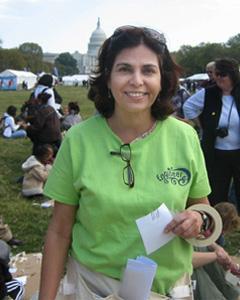Meet EPA Chemist Ana Rivera-Lupiáñez

Ana Rivera-Lupiáñez is a chemist with EPA's Office of Pesticides Program/Health Effects Division of the Environmental Protection Agency in Washington D.C., where she helps assess the registration and proper use of pesticides.
She has been an active member of the AIDIS (Asociación Interamericana de Ingeniería Sanitaria y Ciencias del Ambiente) Technical Committee for many years and is a former member of the San Juan Bay Estuary Consortium and Citizens Advisory Committee. She is also a member of the Society of Women Engineers and the National Registry of Environmental Professionals.
Besides cooking and traveling, she enjoys learning about different cultures and foreign languages. She is fluent in English, Spanish, and Italian.
How does your science matter?
My main responsibility is to develop occupational and residential exposure assessments in support of pesticide registration. These assessments are an important part of evaluating the potential health risks of chemical exposures to occupational handlers and applicators of pesticides in agricultural and residential settings.
As a result of this evaluation process, EPA sets label restrictions on how the pesticide should be used safely, including the frequency of applications, what protective clothing or equipment must be used when handling pesticides, etc. These restrictions are designed to protect public health and the environment.
I also volunteer and actively participate in EPA-sponsored activities that promote the Agency's mission and encourage students (particularly minorities) to pursue Science, Technology, Engineering, and Math (STEM) careers.
If you could have dinner with any scientist, past or present, who would it be and what would you like to ask them about?
I would have loved to meet Leonardo Da Vinci. I consider him the most creative and innovative genius that ever lived. He was way ahead of his time! I would like to ask him what was the inspiration for all his inventions.
What do you like most about your research?
Knowing that I am contributing toward the protection of human health and the environment is very gratifying.
When did you first know you wanted to pursue science?
I was very curious as a child and always wanted to know why and how things work. My "aha moment" was probably during my freshman year in high school when one of my science teachers told me that I should study engineering—specifically chemical engineering—since I was a good math and science student.
Tell us about your science/educational background.
I attended the University of Puerto Rico at Mayaguez and obtained a B.S. degree in Chemical Engineering. Later I pursued a graduate degree in Environmental Management from the Polytechnic University of Puerto Rico.
What brought you to EPA?
I have always treasured the beauty of nature and appreciated its fragility. Additionally, I have always been concerned about the need to protect our environment.
I would like to help youth and adults develop an ethic of environmental stewardship and appreciation. What better place than working with the Environmental Protection Agency? I am very proud to work with this Agency.
If you were not a scientist, what do you think you would be doing?
Even if I didn't work as a scientist I would still like to do science related activities. I would enjoy being an environmental education advocate.
When it comes to education and true environmental stewardship, I am guided by the words of Baba Dioum: "For in the end, we will conserve only what we love; we will love only what we understand; we will understand only what we are taught." Education is the key to healthy and safe communities.
Any advice for students considering a career in science?
There has been a concern over the past several years about the decline in Science, Technology, Engineering, and Math (STEM) education in the United States. If you are interested in pursuing a STEM career, now is the best time to do it since there are many opportunities in the form of internships and scholarships available for students, especially for those from underrepresented groups, including minorities, women, and disadvantaged students. There are numerous opportunities out there! Ask your school advisor to help you, search the Internet for internships, grants, and scholarships, and get a mentor to give you guidance. Look up professional organization chapters in your area and participate or volunteer to help out at their activities and conferences. These could prove to be exceptional networking opportunities to meet potential mentors. You will obtain valuable insight into what STEM professionals do and they will certainly appreciate your assistance and skills!
Editor's Note: The opinions expressed herein are those of the researcher alone. EPA does not endorse the opinions or positions expressed.
